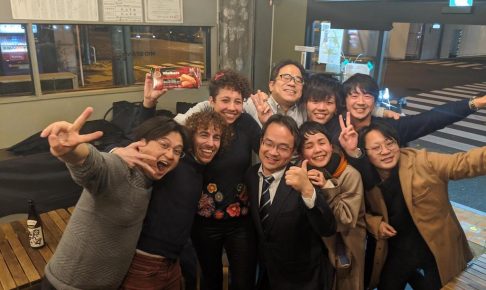
“You were an accident, albeit a happy one,” said my mother in a statement that has somewhat set the tone of my life so far.
I am accident-prone. An accident waiting to happen. And, frequently, I am accidentally inappropriate.
Which is why I thought the entirely inappropriate behaviour of crashing end of year parties sounded like a great way to round off 2019. I had already showed up for life uninvited after all.
In Japan, fulfilling the role of a Western Christmas party is something called a “bonenkai”. This literally translates as a “forget the year party”, which, in all honesty, sounds darkly aspirational. Has the year been so bad that you had better hurry up and forget it? Bonenkai typically involves a meal at a restaurant or izakaya (Japanese-style pub) with an all-you-can-drink course – a definite recipe for some awkward conversations, but equally a good concoction for “forgetting.”
My challenge arose when I was at the bonenkai for Tokyo Survival Channel, celebrating our past year of whacky content and occasional mayhem. Somewhere during the evening, I began boasting about how I got myself invited to weddings in Taiwan and Korea, despite not knowing the couples, just to see what weddings in other countries were like (being the only non-Asian in the family photographs is a unique experience).
So a new challenge was proposed: go out and crash as many bonenkai as possible in Tokyo in one night.
This might sound straightforward, but restaurant reservations involve fixed seats and therefore fixed numbers. Strict hierarchies within companies could also make it tricky to obtain permission. What’s more, Tokyo is sometimes described as an isolating city as it is not the easiest place to strike up a conversation and passing small talk is rare.
But one night is a lot of time to find a lot of people trying to forget the year. Let the challenge begin.
Bonenkai #1 – Make a speech

On a Friday evening, at 5 pm, I am sitting in a meeting room for a TV show I work on. The meeting has already ended, but I’m killing time before a genius plan to crash a university bonenkai with my friend, Tokyo and urban researcher, Joe McReynolds, who has accompanied me on previous challenges. I have my researcher backstory prepared and am armed with the fail-safe line: “I am still new so I am still learning. What do you do?”
However, it’s not meant to be. Joe is waylaid and so I find myself with an evening stretching before me and the weight of the challenge pressing on my shoulder. How on earth will I find a bonenkai, especially so early on in the evening?
I would like to pretend that I sat cleverly scheming and hatched a genius plan involving daring social feats.
But I walk out of the meeting room…into a bonenkai.
Tables laden with food and booze, all yet to be opened, greeted my eyes. The Bonenkai God is smiling upon me.
“Oh, Phoebe! We didn’t know you were joining!”
It’s a department-wide bonenkai, including several people I have worked with on and off on several projects or vaguely knew. I am their first guest. The man on reception is a little confused but there’s enough food and drink to go round, so he lets me add my name to the list and pay the participation fee. Within 5 minutes, I’ve got my name sticker, befriended someone’s 10-year-old daughter and borrowed her Santa hat. Let the party begin.


It’s a great party. If I hadn’t been facing this challenge, I would have felt too awkward to join, but it turns out to be a fascinating and heart-warming hour, during which I reconnect with past colleagues and acquaintances. I speak to a man who plays the drums for a living. I listen to another who was sent to the Berlin bureau in 1988 for a “quiet job” and witnessed the fall of the Berlin Wall. I remember the day very well, he tells me. Checkpoint Charlie was packed with people making the crossing from east to west.

It is approaching 6:30 pm and I need to start moving towards my next goal. As I duck towards the door, an announcement begins.
“A big thank you to our guests! First up, PHOEBE AMOROSO!”
There is massive applause and my jaw drops open. My photographs are being projected across the screen.
SPEECH, SPEECH! Someone is calling my name.
A microphone is thrust into my hand and I hastily scrape the bottom of my brain for some Japanese words.
“I called by the party rather suddenly, but I am very glad that I did,” I say earnestly, before going on to thank the department for various interesting projects over the past 3 years. I have only ever been on the periphery, but I leave the party feeling like I reaffirmed some connections. I also left holding a large cup of delicious Daishichi Junmai Kimoto sake from Fukushima.

6:41 pm. Office bonenkai crashed.
Onwards!
Bonenkai #2 – Sliiiiide to the left

I meet up with Joe and we head over to Shimbashi, land of the salaryman. The area is known for watering holes and greasy, smoky joints catering to its dark-suited crowds. We begin wandering down a crowded street—a likely target for tonight’s challenge. Sure enough, we soon see a group of office workers holding bags of gifts and bowing to each other. A bonenkai!
I quickly ask to join but the boss isn’t having it.
“Forbidden! No! BYE-BYE!”
Rejection stings. And feels very un-merry. Time is ticking and I am beginning to panic.
We continue walking when I make eye contact with two men just next to us. They seem open to conversing. Are you going to a bonenkai, I ask.
Sure, they reply. Yeah, come along.


The two men are Ken and Kouza, and they’re cousins. First of all, they’re on a very important mission to buy lottery tickets for December 31st. It’s 3000 yen for 10. And judging by the queues, a lot of people are hoping to get lucky.

“OK, let’s do a bonenkai now,” they say.
This is when we realise we aren’t going to a party; they are making the party. We are going to have our own private bonenkai, which is basically just a normal nomikai (drinking meeting), but when you have the end of year cheer and end of year lottery tickets, I am sure any nomikai can become a bonenkai!
We head down to a cheap, 24-hour izakaya and start swapping stories while grilling shellfish and drinking sake.



Joe valiantly tackles a turban shell on my behalf. I feel sorry for his trousers.
And then we learn, we are having a bonenkai with none other than the guy who played the guitar on the Cha Cha Slide.

My nineties disco dreams come flooding back. We do a mini-rendition (“Sliiiide to the left Sliiiide to the right! CRISS CROSS!”) as the shellfish continue to sizzle. This is a good way to slide into 2020.
Bonenkai #3 – How to get the party started

The evening is getting on, but I am determined to go for a bonenkai hattrick. I recall a monthly sake bar I used to frequent in Shibuya has moved to Kanda, which is so close. I wonder if they are hosting any bonenkai. Even if they are not, there will be sake. I’ve had sake at my first two bonenkai and a sake hattrick also sounds good.
Their new location is one open room with a bar at one end—a perfect space for casual chatting…or a party. There are two groups of two guys drinking and a small group of four. If any of these are a bonenkai, it must be very small. I am not overly optimistic but I greet one of the founders, Hiroto Mukai, and the okami (female bar staff), whom I know from my many previous visits in Shibuya. It’s great to see them. Just one drink of sake can’t hurt surely? It will give me time to suss out who is here, I reason.

We sit down order and ask the two gentlemen next to us if they are having a bonenkai. They are not, but they love sake. They immediately pull up their chairs to our table and we are soon discussing the taste and sampling some additional varieties.


But I need a bonenkai. I eye the group of four on the other side of the room. They are learning in towards each other, quietly discussing something. It doesn’t seem to be a bonenkai but there is only one way to find out. And my luck is in!
“We are having a mini-bonenkai!” says the girl in the group, beaming.


I am welcomed immediately. They work at a company round the corner and had their team bonenkai a few days ago, but wanted to have a mini, quieter one by themselves. Less formal and easier to chat, one of them nods.
They represent the spirit of the bonenkai. The occasion is not just an office party, but can be for groups of friends to get together, reflect and wind down over a few drinks, shrugging off the tensions and stresses of the past year.
But their quieter bonenkai is no longer very quiet.


I am kindly donated a bottle of sake called “Eau de Desir’ – “Water of Desire” – to share with my new friends (after all, they say never go empty-handed to a party). The other two gentlemen join. There are several rounds of kanpai and cheers. People are asking how everyone knows each other, what they are doing and which sake they like. Joe and Mukai san and bound up to me and proclaim they are brothers! One of my new companions even tries to invite me to snowboarding.


Bonenkai crashing sounds like breaking the party, but in this case, it seems to involve making the party. Before I leave, I crack open a box of Walkers shortbread I had brought for sharing (which, incidentally, is about the only “British” snack sold in shops in Japan).
There are 12 biscuits in the box, and there are 12 people in the room, and it’s the 12th month of the year. We all munch on them together. What a perfect way to close the night.

Finishing 2019 How I Mean to Go On … Generally Showing Up to Life Uninvited
Crashing bonenkai taught me a very important thing.
One of the best ways to forget the year is making new friends to face the next year with.
What started off as an experiment in breaking social norms became a lesson in making human connections. As I found during my challenge to learn the secrets of those drinking in Showa-style alleyway Omoide Yokocho, it’s people that make places. Head out into Tokyo, or anywhere, with an open mind and willingness or even a goal to talk to those you encounter, and it is like invisible doors open, revealing a whole new city.
I might be an accident, but a lot of life seems like one big accident too. It is an adventure and you only live once. Invite yourself. Make 2020 your best year yet.


















